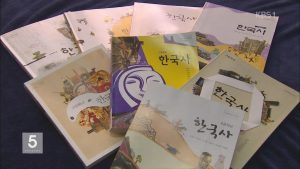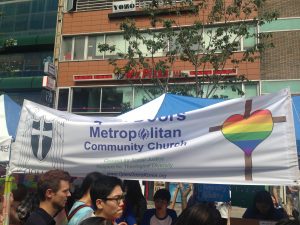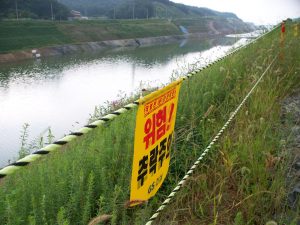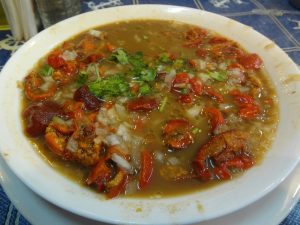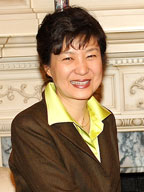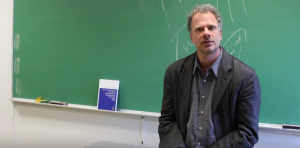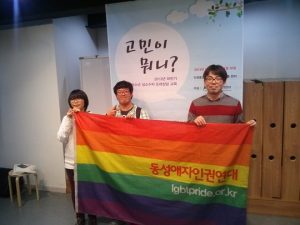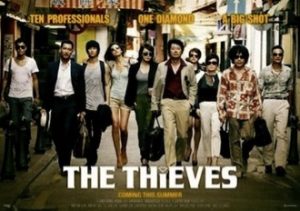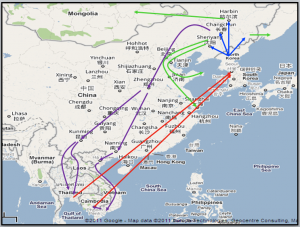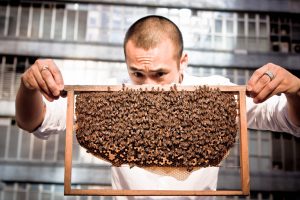South Korea Moves Ahead with Plans to Publish State-Authored Textbooks
Memo #348 By: Rufina K. Park – rufina.park [at] asiapacific.ca South Korea Nationalizes History Textbooks In October 2015, the South Korean government announced its decision to nationalize middle and high school history textbooks, which means that starting from 2017, schools will no longer have the option to choose from Ministry of Education approved independent publications. Instead, the […]
Integrating Sexual Minorities in South Korea
Memo #321 By Joseph Yi – joyichicago [at] yahoo.com, Joe Phillips – joephillips5 [at] gmail.com, Heather Yang – heatheryang0102 [at] gmail.com The LGBT (Lesbian, Gay, Bisexual, Transgender) occupy a peculiar place in South Korean society. By maintaining somewhat sexually free, separate social enclaves, they avoid significant public backlash and government oppression. However, they have no […]
A Canal Runs through It: Seoul’s Ara Waterway at Two
Memo #293 By Daniel Kane – danielkane [at] gmail.com The Han is the river of the South Korean capital of Seoul, and for most of that city’s history it served as highway to the Yellow Sea, some twenty kilometers to the west. To be sure, it still does, but since 1953 and the Korean War armistice […]
Of Sea Squirts and FTAs
Memo #283 By Hyung-Gu Lynn – hlynn [at] mail.ubc.ca Ten years ago today, April 1, 2004, the Chile-South Korea free trade agreement (FTA) came into effect. This landmark agreement marked Chile’s first FTA with an Asian country, and South Korea’s first FTA altogether. But what do sea squirts (Korean meonggye/Spanish piure) have to tell us […]
The Paradox of Women Leaders in Asian Democracies
Memo #277 By Timothy S. Rich – timothy.rich [at] wku.edu Political life in Asian countries is often characterized as a man’s world, especially compared to its Western counterparts. Yet we have also seen increasing political leadership opportunities for women in the region. Since 2000 alone, women have been elected prime minister in Bangladesh and Thailand, […]
The Global Intensification of Supplementary Education
Memo #271 Featuring Julian Dierkes Recently, Ee-Seul Yoon of the Faculty of Education at UBC in coordination with the Asia Pacific Memo sat down with Dr. Julian Dierkes, Associate Professor and Keidanren Chair in Japanese Research at UBC’s Institute for Asian Research, to pose a few questions about Professor Dierkes’ recently co-edited volume, Out of the Shadows: The Global […]
To Be Queer and Christian: Organizing for Queer Youth in Korea
Memo #270 By Joseph Yi – joyichicago [at] yahoo.com & Daniel Payne – koreanrainbow [at] gmail.com South Korea has among the highest rates of suicide among developed (OECD) countries, peaking at 28.4 per 100,000 people in 2011. Hidden among these tragedies are LGBTQ (Lesbian, Gay, Bisexual, Transgender, Queer), whose sexuality is often rejected by Korean […]
Hybridity is the New Norm: Korean Cinema in a Global Age
Memo #248 By Dal Yong Jin – yongjin23 [at] gmail.com After a period of recession, the Korean film industry has experienced a revival in recent years with the market success of several hybrid films, successes that have served to boost the overall market share of domestic films in Korea. Prior to this, the domestic Korean […]
The Complexity of North Korean Migration
Just imagine you’re a North Korean living in a small village. You have no one to compare your condition with. One day, you hear about people who’ve fled to China who are now well off. Some even go to South Korea, a place you know about from smuggled DVDs. You know that if caught, you could be sent to prison and beaten by guards. If successful, such migration promises a better life.
Urban Beekeeping: a new buzz in Asian cities
We need bees, but bees are dying. This is a global problem, but some Asian cities are finding novel solutions in urban beekeeping.
The humble Apis Mellifera punches well above its tenth of a gram weight. Through transferring pollen, bees are essential to 80% of the food we consume. Furthermore, the economic input from bees is substantial, with pollinated crops accounting for $1 trillion of the yearly agricultural produce sold.
